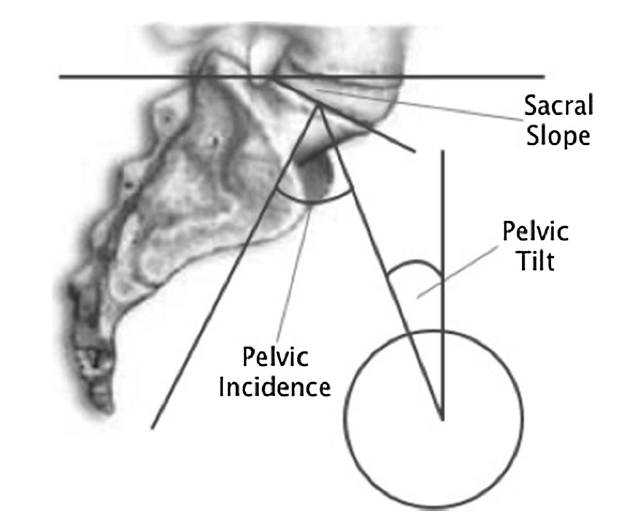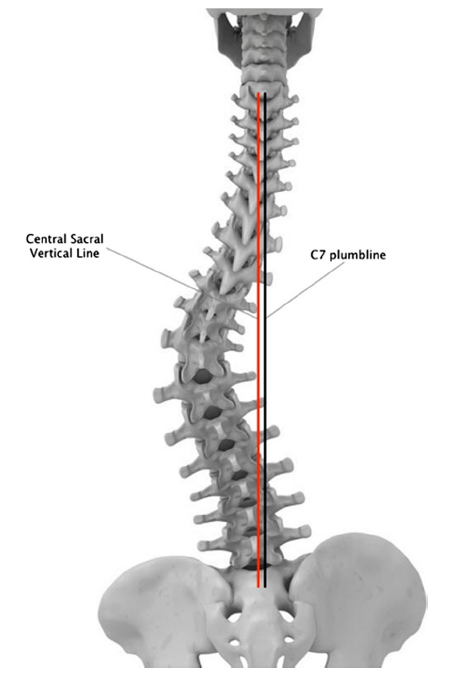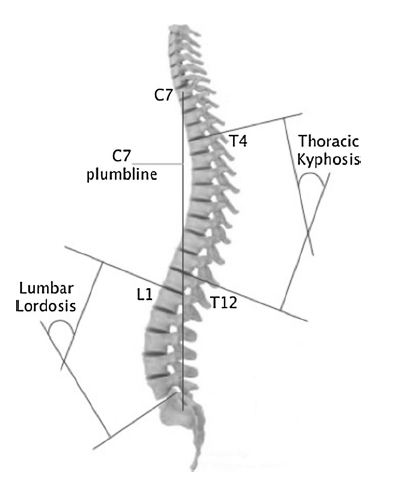Forskel mellem versioner af "Spinal balance"
Admin (diskussion | bidrag) (→Pelvic parameters) |
Admin (diskussion | bidrag) |
||
| Linje 1: | Linje 1: | ||
| − | = | + | =C7 plumbline <3 cm= |
| − | |||
| − | |||
| − | |||
| − | =Lumbar Lordosis (LL)= | + | =Pelvic Incidence (PI=PT+SS) 48-55º= |
| + | Angle between the perpendicular line drawn from the center of the S1 endplate and the line that joins the center of the femoral heads to the center of the S1 endplate. PI is an angle that is '''anatomically fixed''' and is specific for each individual. This angle does not change after adolescence. High pelvic incidence (PI) increases the risk of sagittal imbalance after spine fusion and is a predictive factor for degenerative spondylolisthesis. | ||
| + | |||
| + | =Pelvic Tilt (PT=PI-SS) 12-18º= | ||
| + | Angle between the line that joins the center of the femoral heads to the center of the S1 endplate and the vertical line through the center of the femoral heads. The pelvis can rotate around the femoral heads up to a certain limit. This rotation is characterised by the pelvic tilt (PT). When the pelvis rotates backwards (retroversion), PT increases; when the pelvis rotates forward (anteversion), PT decreases. An increase in PT after surgery is correlated with postoperative back pain. Restoration of a normal PT after surgery is correlated with good clinical outcome. | ||
| + | |||
| + | =Sacral Slope (SS=PI-PT) 36-42º= | ||
| + | The sacral slope (SS) is the compensatory angle of PT and characterises the S1 endplate position. A decreased SS after fusion have a higher risk of adjacent segment degeneration. | ||
| + | |||
| + | =Lumbar Lordosis (LL) 43-61º= | ||
Angle between the superior L1 endplate and the S1 endplate. | Angle between the superior L1 endplate and the S1 endplate. | ||
| Linje 11: | Linje 17: | ||
Angle between the superior T1 endplate and the superior T12 endplate. | Angle between the superior T1 endplate and the superior T12 endplate. | ||
| − | =SVA | + | =Sagittal Vertical Axis (SVA)= |
| − | Sagittal distance between the vertical line through the center of C7 body (C7 plumbline) and the vertical line through the posterosuperior corner of the S1 endplate. | + | Sagittal translation of C7 plumb line. Sagittal distance between the vertical line through the center of C7 body (C7 plumbline) and the vertical line through the posterosuperior corner of the S1 endplate. An abnormal sagittal vertical axis (SVA) after fusion have a higher risk of adjacent segment degeneration. |
| + | |||
| + | =Inflection Point= | ||
| + | Transition from lumbar lordosis (LL) to thoracic kyphosis (TK) is a point called the inflection point. The inflection point is not necessarily located at T12–L1, as written by anatomy textbooks, but varies according to the value of PI; its location may range from T10 to L2. | ||
=Figurer= | =Figurer= | ||
Versionen fra 17. okt 2014, 01:24
Indholdsfortegnelse
C7 plumbline <3 cm
Pelvic Incidence (PI=PT+SS) 48-55º
Angle between the perpendicular line drawn from the center of the S1 endplate and the line that joins the center of the femoral heads to the center of the S1 endplate. PI is an angle that is anatomically fixed and is specific for each individual. This angle does not change after adolescence. High pelvic incidence (PI) increases the risk of sagittal imbalance after spine fusion and is a predictive factor for degenerative spondylolisthesis.
Pelvic Tilt (PT=PI-SS) 12-18º
Angle between the line that joins the center of the femoral heads to the center of the S1 endplate and the vertical line through the center of the femoral heads. The pelvis can rotate around the femoral heads up to a certain limit. This rotation is characterised by the pelvic tilt (PT). When the pelvis rotates backwards (retroversion), PT increases; when the pelvis rotates forward (anteversion), PT decreases. An increase in PT after surgery is correlated with postoperative back pain. Restoration of a normal PT after surgery is correlated with good clinical outcome.
Sacral Slope (SS=PI-PT) 36-42º
The sacral slope (SS) is the compensatory angle of PT and characterises the S1 endplate position. A decreased SS after fusion have a higher risk of adjacent segment degeneration.
Lumbar Lordosis (LL) 43-61º
Angle between the superior L1 endplate and the S1 endplate.
Thoracic Kyphosis (TK)
Angle between the superior T1 endplate and the superior T12 endplate.
Sagittal Vertical Axis (SVA)
Sagittal translation of C7 plumb line. Sagittal distance between the vertical line through the center of C7 body (C7 plumbline) and the vertical line through the posterosuperior corner of the S1 endplate. An abnormal sagittal vertical axis (SVA) after fusion have a higher risk of adjacent segment degeneration.
Inflection Point
Transition from lumbar lordosis (LL) to thoracic kyphosis (TK) is a point called the inflection point. The inflection point is not necessarily located at T12–L1, as written by anatomy textbooks, but varies according to the value of PI; its location may range from T10 to L2.


